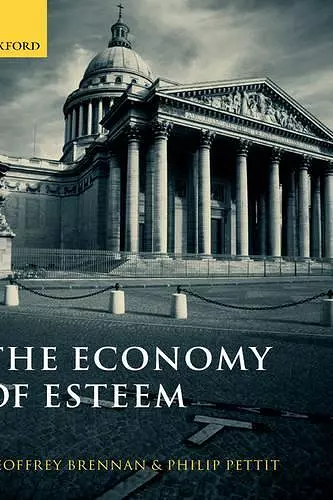The Economy of Esteem
An Essay on Civil and Political Society
Philip Pettit author Geoffrey Brennan author
Format:Hardback
Publisher:Oxford University Press
Published:18th Mar '04
Currently unavailable, and unfortunately no date known when it will be back
This hardback is available in another edition too:
- Paperback£49.99(9780199289813)

However much people want esteem, it is an untradable commodity: there is no way that I can buy the good opinion of another or sell to others my good opinion of them. But though it is a non-tradable good, esteem is allocated in society according to systematic determinants; people's performance, publicity, and presentation relative to others will help to fix how much esteem they enjoy and how much disesteem they avoid. The fact that it is subject to such determinants means in turn that rational individuals are bound to compete with one another, however tacitly, in the attempt to control those influences, increasing their chances of winning esteem and avoiding disesteem. And the fact that they all compete for esteem in this way shapes the environment in which they each pursue the good, setting relevant comparators and benchmarks, and determining the cost that a person must bear -- the price that they must pay -- for obtaining a given level of esteem in any domain of activity. Hidden in the multifarious interactions and exchanges of social life, then, there is a quiet force at work -- a force as silent and powerful as gravity -- which moulds the basic form of people's relationships and associations. This force was more or less routinely invoked in the writings of classical theorists like Aristotle and Plato, Locke and Montesquieu, Mandeville and Hume and Madison. Sometimes it was invoked to explain why people behaved as they did, sometimes to identify initiatives whereby they might be persuaded to behave better. Although Adam Smith himself gave it great credence, however, the rise of economics proper coincided with a sudden decline in the attention devoted to the economy of esteem. What had been a topic of compelling interest for earlier authors fell into relative neglect throughout the nineteenth and twentieth centuries. This book is designed to reverse the trend. It begins by outlining the psychology of esteem and the way the working of that psychology can give rise to an economy. It then shows how a variety of social patterns that are otherwise anomalous come to make a lot of sense within an economics of esteem. And it looks, finally, at the ways in which the economy of esteem may be reshaped...
Brennan and Pettit's book raises a great number of questions of both theoretical and empirical importance. Innovative and illuminating, this book is an interesting contribution to philosophically inspired social sciences. * Diego Rios, Economics and Philosophy, Volume 22, 2006 *
Although aimed primarily at academics specialising in economics or behavioural studies, this is an interesting volume that provides a framework for analysing individual and group behaviour that as far as this reviewer is concerned has relevance far beyond the discipline of economics. * First Trust Bank Economic Outlook and Buisness Review 21.3, September 2006 *
'...The Economy of Esteem illuminates a serious inadequacy in the way that the economic approach has been used conventionally; its own creative use of that approach makes its claims all the more credible.' * Zev M. Trachtenberg, Ethics *
'...Brennan and his co-author Pettit are laying out some of the most important arguments in social science today...Read this book carefully. It could, should, and probably will give rise to many subsequent studies.' * Tyler Cowen, Politics, Philosophy & Economics *
ISBN: 9780199246489
Dimensions: 242mm x 162mm x 25mm
Weight: 672g
352 pages